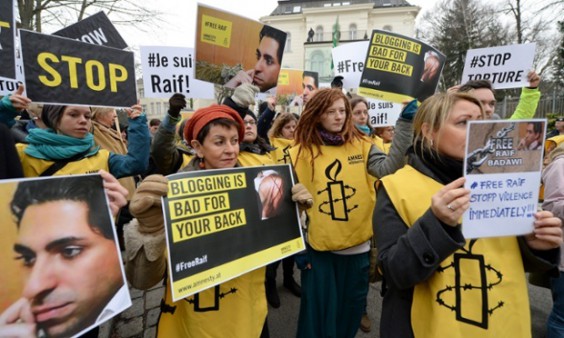Are Saudi Intellectuals Alone?
by Tarık Günersel / March 26, 2015 / No comments
In Saudi Arabia, Raif Badawi faces the death penalty. “Human rights? What human rights?!” say the despots in Saudi Arabia, Iran, and Turkey.
Freedom House
… rated Saudi Arabia at a 7, the lowest possible on its scale from 1 to 7, in 2015.
Blogger Raif Badawi faces the death penalty
See PEN International’s call for Badawi’s conviction to be overturned.

- Life is words in action, literature is action in words.
- Humans are about to destroy their spaceship Earth. Some of them are aware of this and they try to change the course of events. Will they succeed? Will more humans be alarmed and do something?
- Literature is vital and translators are messengers of world peace.
- Though I shall focus on the literary scene in Turkey and its problems regarding freedom of expression, I shall not omit the other parts of our planet. Today local is global and vice versa.

- Tarık Günersel is a poet, playwright, aphorist, librettist and short story writer. He is the president of PEN Turkey and an ex-member of the PEN International Board. He studied English Literature at Istanbul University. A self-exile after the military coup in 1980, he spent four years in Saudi Arabia with his wife Füsun and their daughter Barış, teaching English. A dramaturg at Istanbul City Theater since 1991, he has acted on stage and screen and directed some of his plays. He proposed World Poetry Day in 1997 which was accepted by PEN International and declared by UNESCO as the 21st of March. His translations into Turkish include works by Samuel Beckett, Vaclav Havel and Arthur Miller. His works include The Nightmare of a Labyrinth (mosaic of poems and stories), and How’s your slavery goin’? His Oluşmak (To Become), a “life guide for myself,” includes ideas from world wisdom of the past four millennia. He has recently initiated the Earth Civilization Project with the support of several intellectuals from various parts of the planet.
Saudi Arabia
Since its establishment in 1932, the country has been an absolute Islamist monarchy under the influence of Wahhabism. In 1938, the discovery of oil reserves led to the foundation of US-controlled Aramco (Arabian American Oil Company) in 1941. In 1980, Saudi Arabia took full control of Aramco. Rapid modernization and the presence of increasingly large numbers of foreign workers affected traditional Saudi norms and values.
Sandification
From 1982-1986 I worked at Aramco as an English teacher. Promising young men were sent to American universities, and, in accordance with the Saudization program, Americans were systematically replaced by Saudis. I thought Saudization would force male employees to support their wives to be more active in daily life, as I mentioned in my memoirs, Sandification (Kumlaşmak). The Western-educated youngsters would want significant changes in Saudi social life. An optimist, I expected significantly positive changes within twenty years.
Reactions
Not surprisingly, Saudi Arabia’s relations with the West caused worry among conservatives. Osama bin Laden was a Saudi national until 1994. Unequal distribution of wealth also caused tension. In response to unrest, King Fahd initiated a number of limited “reforms,” which made it clear that he did not have democracy in mind: consultation, rather than elections, harmonized with Islamic Law.
Since 2011, Saudi Arabia has been affected by its own Arab Spring protests. In response, King Abdullah made economic moves to please the masses. Although male-only municipal elections were held in 2011, he announced that women would be able to vote and be elected in the 2015 municipal elections, and also to be nominated to the Shura Council.
Homosociality
By law, women have to lead homosocial lives, whereas Saudi men can work with female foreigners.
In addition to the social imprisonment of Saudi women in daily life, poverty has been a serious problem. King Salman recently began his reign by giving large sums of money to students, government employees, people with special needs, and those on welfare.
Tribute to Atatürk
In Saudi Arabia, I realized how much I, like the majority of other Turkish citizens, owe Atatürk, the secularist founder of the Republic of Turkey. His leadership prioritized women’s equality and secularization.
Saudi Turkey!
Unfortunately, during the past decade, Erdoğan, supported by the US in accordance with Huntington’s strategy, has pushed Turkey towards Saudi Arabian norms and values. Even in Saudi Arabia, young girls do not wear headscarves. In Erdoğan’s Turkey today, we now see little children covering their hair.
What can you do?
Are Saudi Arabian intellectuals alone? Their cells – I mean, homes – in Saudi Arabia, are bitterly isolated. (More and more so, this is also true in Turkey.) I refrain from saying here “they are not alone because there are significant international organizations and individuals who care for them and actively try to be helpful,” because then you might feelthink (I prefer to combine the two verbs) that you don’t need to do anything.
How come the US and some other Western countries have been so eager to get rid of secularist regimes in the Middle East but have maintained silence about the brutal Saudi Arabian dictatorship? For the sake of oil, of course.
If you are a US or German citizen, from a country that has strong financial connections with Saudi Arabia, then you can demand action from your government.
PEN International
… is more than a global club for writers to meet and exchange ideas: it is also an institution dedicated to freedom of expression and the ideal of world peace. So you might want to visit pen-international.org for news regarding literature and freedom of expression. You could also contribute to the struggle for freedom by sending an email to authorities who share responsibility for state terror.
Why not start with Raif Badawi’s case? You can send a petition to the Saudi Arabian authorities. The necessary information is available on PEN International’s website.
Post-Oil Middle East
The main financial source of the so-called Islamic regimes will come to an end with its last barrel of oil. If Islam can have any chance to survive for a few centuries more, it will be thanks to its humanist vision, such as that of Rumi.
Freedom will not be an automatic outcome of the end of oil. On the contrary: Even worse periods of fascism are possible, lacking the necessary funds to calm down the low-income masses.
That is why it is vital to develop the roots of a secular and democratic Middle East, which has nothing to do with the US’s strategy for re-designing the region.





